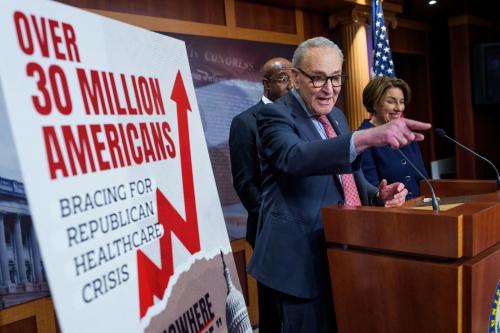HHS Secretary Kathleen Sebelius may lose the most from the Senate’s rule change on the filibuster—and the Affordable Care Act may be healthier for it. I wrote last month on the FixGov blog that “Republicans are the Reason Secretary Sebelius Won’t Resign” (or be fired). That argument is no longer valid. My claim—the president’s inability to get her successor confirmed because of filibustering Republicans—is nullified by the Senate’s rule change, and the benefits may reach far beyond Obamacare.
The Implications of Filibuster Reform for Healthcare
Problems exist in HHS. No one denies it. However, for many appointees in the Department, the Senate rules served as a life preserver in a torrent of poor implementation, managerial failures, and bad PR. So long as the president faced the prospect of long-term vacancies among appointees overseeing ACA, the HHS leadership would be spared.
Today, that all changed. Moving forward, President Obama needs the support of only 51 Senate Democrats to replace top-level political appointees throughout the executive branch. This offers the president substantial breathing room. Nominees no longer need the support of every Democrat and a scarcely identifiable five Republicans. Instead, nominees can draw the ire of as many as four Democrats and still be confirmed.
Maybe Kathleen Sebelius is not to blame for the botched healthcare marketplace roll out. Maybe her Office did not give the thumbs up for the President to repeat “if you like your plan you can keep it.” Maybe she did not contribute to the poor salesmanship of the legislation from the start. However, if she was to blame (and perhaps if she wasn’t), her days in the president’s cabinet may well be numbered. The same may be true for deputies and other administrators in the Department who oversaw the weaker areas of the roll out of this law.
By repositioning HHS personnel or breathing new life into a Department facing continued struggles, the president may well ensure the administration of his signature legislation accomplishment improves. The right appointees can coordinate and communicate policy needs and goals up and down the bureaucratic hierarchy. Rather than settling for a program that meets or falls short of expectations, there is an opportunity to build an effective ACA.
Good Governance beyond Obamacare
The first half of October showed us that political actors in Congress contributed to a broken legislative branch. The second half of October showed us that political actors in the Administration contributed to a broken executive branch. Now is the time for the president to start anew and fix one branch, in the shadow of a Senate trying to fix itself.
In my piece from last month, I also argued that the filibuster rules in the Senate allow for the continuation of poor management and governance. If weak appointed personnel are causing policy problems, communication miscues, and other headaches for the president, the ability to replace them with something other than the word “ACTING” was limited by the 60-vote threshold.
President Obama, who has faced a string of personnel and management issues over the past year, now has greater freedom not simply to oust problematic appointees, but to install talented, effective leaders. With this ability comes a tremendous opportunity to jumpstart an administration that is sputtering.
Filibuster reform will not be the magical elixir that cures all of the ills in the Obama administration. Yet, it’s a good start. The President should channel the flashiness of his campaigns and loftiness of his rhetoric into a focus on real issues of governance.
The Brookings Institution is committed to quality, independence, and impact.
We are supported by a diverse array of funders. In line with our values and policies, each Brookings publication represents the sole views of its author(s).




Commentary
HHS Secretary Sebelius is the Big Loser in Today’s Filibuster Game-Changer
November 21, 2013